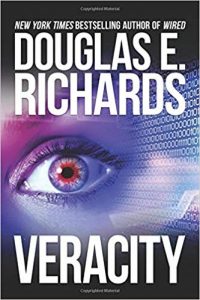
Brave New Truthful World – Douglas E. Richards latest novel wonders “What if you could pop in a contact lens that told you if someone was lying?” What if everyone did?
The world isn’t as bad as they say, author Douglas E. Richards tells us. Sure, there’s a lot worth worrying about, but with all the spin doctoring on both sides of any issue, it’s nearly impossible to make an informed decision about what to do to fix what’s actually broken.
But what if you couldn’t get away with lying? What if everyone saw the world through truth colored (contact) lenses? Wouldn’t that be great? Veracity is the author’s attempt to make that case, hung on an action plot where the bad guys are trying to suppress lie detectors that are ubiquitous, infallable, and so easy to use that they drop below your conscious awareness, leaving you with the sure knowledge that you can tell if someone is truthing (green flash), lying (red flash), or carefully walking the line (yellow flash).
Veracity’s main character, Conner Gibson, writes articles about technology and science for popular magazines. He’s really good at it, but what he wants is to write a blockbuster techno-thriller, and after a month of getting nowhere, he’s starting to fantasize about throwing his computer out the window. Ironically, he’s about to find himself in the middle of just the kind of plot that’s eluding him when his father, Elias, a retired dot com VR pioneer, asks him to come see what he’s been working on since he stopped working.
ELias has used deep learning machine techniques to create an AI that acts as an infallible lie detector. How does it do it? THat’s the beauty of machine deep learning. Ultimately it comes down to a statistical process, but the cues the machine is using are buried somewhere in the results of billions of attempts to identify truth from fiction. That’s handy, but the real trick is that Elias has embedded a simple indicator in wifi enabled contact lenses that allow the supercomputer to monitor and report in real time anywhere there’s a wifi internet connection.
In no time at all Connor and his wife Paige are on the run with Elias and a woman going by the name of Kayla, while mercenaries try really hard to kill or capture them, on the orders of a mysterious person who the mercs only know at Vader, thanks to the voice changing tech he/she uses. Why? Because not being able to lie is game-changing and Vader likes being the one who makes the rules.
Fro there on it’s all action and adventure as the foursome race from hiding place to hiding place and more and more players enter the chase. Truthfully, the plot is pretty thin, the big reveal not as surprising as you might hope, and the bulk of the book is taken up by “what if” discussions about the nature of society and the utility of using the new technology.
Richard’s choice of a technology writer who wants to write technothriller blockbusters is pretty ironic, because he’s the book is clearly an attempt to do just the opposite, hiding a techno-screed inside an action novel.
The notion of an infallible truth machine isn’t new, of course. Offhand I can remember two books using them. First, there’s The Truth Machine by James Halperin, which I reviewed back in 1996, and which uses the same plot twist as Veracity, which is not actually surprising because it’s the obvious ploy. Second, there’s the whole series of Noah Wolf Thrillers by David Archer where Noah and his team have glasses that also do the truth-telling trick, if with less AI goodness. By the way, both Richards and Archer are “bestselling” authors and both of these works are available on Kindle Unlimited for free if you’ve got a subscription.
Am I harshing on Richards? Yes, a bit, but if you look at all the fan reviews for the or any of his books, you’ll get the impression that it’s a terrific piece of action adventure. The truth is that it’s an interesting exploration of why the author thinks that being able to trust information can make the world a better place. It’s important to note that he thinks the world is actually a much better place than fearmongers let us believe, and no doubt he’s right about that. Whether he’s right about pervasive lie detection is another story. I’m pretty sure that he’s underestimating the ability of people in the public eye, whether they’re politicians or news anchors, to cherry-pick facts that support their case and the way press secretary’s and other front persons are firewalled from the actual truth.
All that being said, there is a high energy romp in there, and the author’s case is worth hearing out. Unfortunately, the book really only covers the setup of his brave new world and not the much-needed exploration of its outcome.